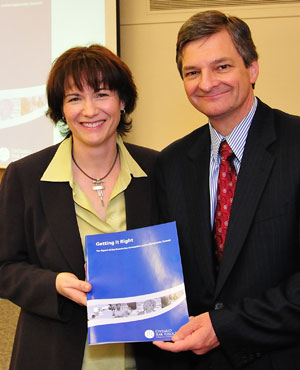An Ontario Bar Association report recommends sweeping changes to the province’s justice system, and one of the organization’s section chairwomen says it’s among a series of reports that could build momentum for the movement to revitalize.

Heather McGee, chairwoman of the OBA’s access to justice committee, tells Law Times that the timing for the report’s release couldn’t be better.
She notes that the report, titled “Getting it Right: the Report of the Ontario Bar Association Justice Stakeholder Summit” (www.oba.org), closely follows former associate chief justice Coulter Osborne’s report on the Civil Justice Reform Project, and leads the upcoming release of a review of legal aid.
“What we’re hoping it does is give a voice to the users of the justice system that can be heard with the other reports so that we can create the momentum for change in the justice system,” says McGee.
The report, which was submitted to Attorney General Chris Bentley on May 8, follows a three-day justice stakeholder summit held in June 2007. The report offers recommendations for change in all areas of justice, including civil, criminal, and family law.
The OBA listed a number of the recommendations as particularly pressing:
• Population growth has made an increase in the judicial complement necessary.
• Justice services need to be integrated better. For example, domestic violence incidents currently may be dealt with in both the criminal and family law spheres.
• The public needs to be better educated on the ins and outs of the system.
• Specialty courts should be created for drug offences, mental health patients, and domestic violence.
“When we presented the report to the attorney general . . . we called for a systemic review of all the parts of the justice system,” says McGee. “Our president has spoken on the need to stop applying bandages, and this report is a comprehensive report.
It covers three full streams - there’s no area of the justice system it leaves untouched. It talks about legal aid, it talks about security, urban communities, rural communities, calls on the need for the appointment of more Superior Court justices, so there’s an ask at the federal level.”
The OBA has found that users of the system want it to work “from every angle,” says McGee.
The OBA didn’t want to limit discussion at the summit, and while she recognizes all the recommendations can’t be put in place, the report offers policy- makers a variety of options, she says.
“This gives them a buffet to pick from and they can work through the report, and initiatives that are already underway . . . this can fuel those initiatives, and ones that have been set aside can be reconsidered,” says McGee.
Criminal Lawyers’ Association Toronto regional director Andras Schreck says the changes would require massive funding contributions from the government, and that many of the OBA report’s recommendations have been raised before.
“I’m skeptical about how much change a study like this will prompt,” says Schreck. “It certainly contains a lot of good ideas. A lot of it is going to cost the government a great deal of money, and getting the government to spend a great deal of money is never easy.”
The CLA has lobbied for years with “very limited success” for legal aid increases, says Schreck, and the recommendation to consolidate two levels of court for criminal matters, “is an idea that’s been kicking around for the better part of two decades,” he adds.
“As far as I’m aware, there’s never been any significant movement towards accomplishing that. I know there may be some resistance to it among some members of the judiciary.”
Randall Bocock, chairman of the County and District Law Presidents’ Association, says it’s vital to understand issues of access to justice before making any recommendations on changes to the system.
“The system itself is substantively the envy of the common law world,” says Bocock. “The problem is, procedurally, it’s like having a 1975 Eldorado convertible: it’s wonderful interior, and it’s a great ride, but the access to it - the door locks and the engine - aren’t functioning properly.
We’ve got to break down those barriers and get speedy access to judges, judicial resources, courtroom services, and effectively fund through an expansion of legal aid tariffs and also an expansion of the actual certificate base of legal aid, so that people can gain access to that wonderful model.”
McGee says the report highlights that justice in the province is working well, but tweaks are required.
“Ontario’s justice system is a model worldwide,” she says. “It does work, but it needs to work better to keep up with the needs of the population, the growth in population, the growing sophistication of criminal and civil law.
And we repeatedly heard calls for reform of family law, in that we need a more consistent approach to family law.”

 Heather McGee, chairwoman of the OBA’s access to justice committee, tells Law Times that the timing for the report’s release couldn’t be better.
Heather McGee, chairwoman of the OBA’s access to justice committee, tells Law Times that the timing for the report’s release couldn’t be better.